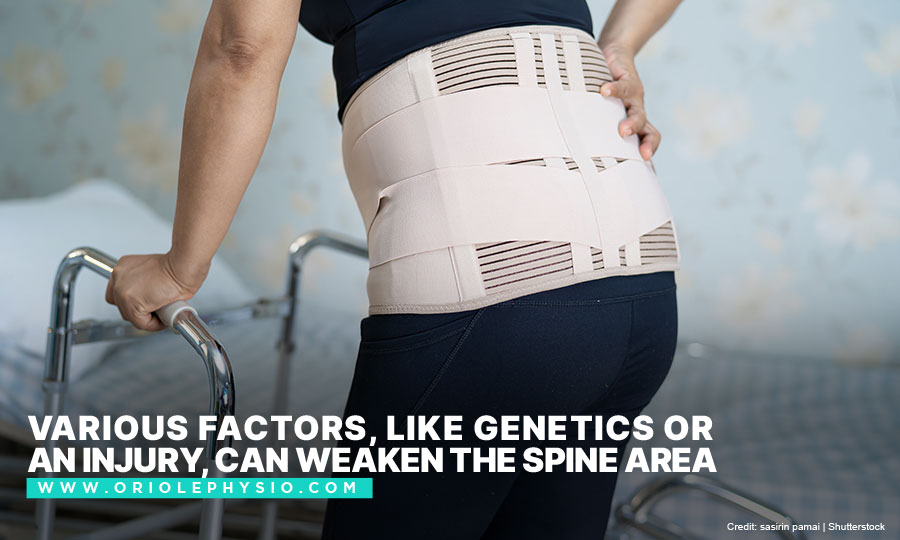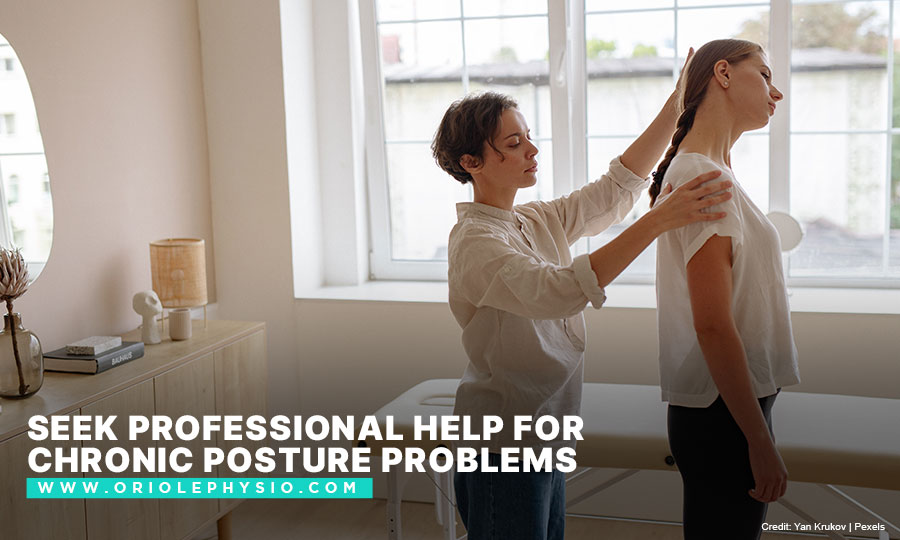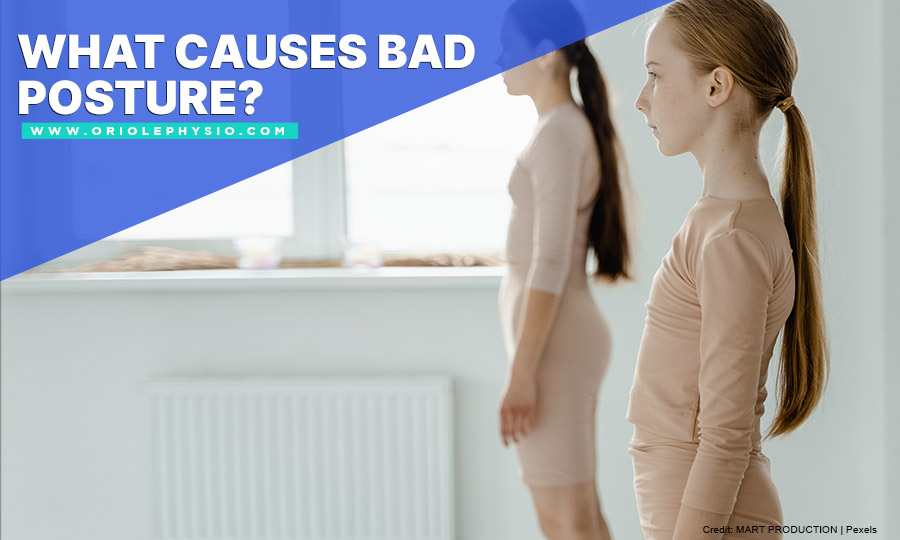What Causes Bad Posture?
Posture describes the alignment of the spine with the head, shoulders, and hips while standing or sitting. When one has a good posture, the spine should be neutral, and the muscles, joints, and ligaments are aligned in a way that lessens strain, allows flexibility, lessens fatigue, and helps stay balanced. However, whether or not we are aware of it, a majority of people slouch more than what is healthy for the spine.
Poor posture can be caused by a multitude of things, including basic acts like sitting down or more significant scenarios like being involved in an accident. The effects of poor posture are many. Not only do postural issues affect one’s self-esteem, but they can also lead to tension and discomfort, muscle pain, poor digestion, and exhaustion.
Symptoms of Bad Posture
Below are the signs of bad posture that you should watch out for:
- Spine Curvature
A properly aligned spine has 3 major curves that form an “S” shape. Bad posture, however, can cause the natural curve of the body to change shape, placing too much pressure on the wrong body regions. A hunched back tends to be most common in teenagers and young adults and frequently occurs alongside a forward head posture and rounded shoulders. - Back Pain
In addition to the flattening of the back muscles, slouching forward adds more pressure between the shoulder blades. Over time, bad posture causes joint stiffness and strain in the upper back muscles resulting in pain throughout the upper body, particularly feeling neck and back pains. - Headache
Having bad posture strains the posterior muscles, negatively affecting the neck. A forward head posture puts a lot of pressure on the joints and discs of the neck as they work to support the weight of the head. In this position, the neck muscles get overused and it increases the tension in the region where the muscles attach to the back of the head. The strain caused by the tightness of these muscles creates tension headaches. - Poor Sleep
Insufficient sleep can also be a sign of having a bad posture. The entire muscle system can be compromised as a result of having poor posture. Tossing and turning at night to find a position that is comfortable for the neck and back may result from an inability to completely relax the body, which can lead to hours of lost sleep. - Digestive Issues
Bad posture can also lead to digestive issues. Having bad posture can compress the organs, which hinders proper digestion and causes gastrointestinal tract problems. Bad posture can also trigger heartburn by acid reflux as slouching adds pressure to the stomach forcing the acid to move in the opposite direction. - Low Self-Esteem
Bad posture is also associated with low confidence and self-esteem. Studies show that those who have good posture and sit up straight have higher self-esteem than those who don’t, and confidence appears to be low in people who tend to slouch.
What Are the Main Causes of Bad Posture?

Unfortunately, bad posture is the result of various factors. Taking into account the factors getting in the way of good posture may be of great help in making lifestyle adjustments.
Bad posture can be caused by any of the following:
- Daily Habits
It is easy to ignore how people handle their posture as a means to accommodate muscle spasms and strain while doing simple everyday habits, such as poor sitting position. In situations like this, the body is pushed to employ different, less effective muscle contraction and stretching patterns. Although the body can accomplish the movement, the alignment of the spine and the muscle gets compromised. - Genetics
In some cases, it’s all in the genes. Some people are born with conditions that affect the development of their hips and spine and can influence their posture from birth. Fortunately, such conditions can be managed with the help of treatments from healthcare professionals. - Injury and Muscle Guarding
Bad posture can also be caused by an injury. After an injury, muscles tend to spasm as a way to protect the once injured area. While they can keep the injury stable and keep them from additional harm, muscle spasms can also restrict motion while causing pain.
Over time, the recurring muscular spasms cause muscles to weaken. The difference between the muscles protecting the injury and those that still function normally can lead to abnormalities in body posture.
- Stress
Bad body posture is not only caused by physical factors, emotional factors such as stress can be responsible as well. Stress causes frequent tightness in the muscles compromising the body’s posture. - Muscle Tension and Muscle Weakness
Holding a prolonged position repeatedly and performing chores that put a strain on the muscles, the risk of developing muscle weakness and tension increases. Posture can then be compromised by these weak and tense muscles. - Shoe Choice
Shoes, especially those that do not offer good support, can also negatively affect the posture. Worn-out shoes can transmit unbalanced forces up to the ankle, knee, hip, and lower back which can cause pain and bad posture. High heels can also cause misalignment as they don’t give enough support to the body. - Use of Technology
Nowadays, the majority of people are more concerned with using their phones or finishing their work on their laptops than they are with paying attention to their posture. Sitting all day in front of a computer or using smartphones can cause the body to go gradually out of alignment. The constant bending of the head down puts so much stress on the spine causing Text Neck. This condition refers to a posture problem created by an extended usage of a mobile phone, tablet, or other comparable handheld electronic devices.
How to Fix Bad Posture

The key to having a healthy posture is the alignment of the spine. The following techniques and practices can help in fixing bad posture:
- Stand Tall and Sit Straight
Although you might not give it much thought, how you stand has a significant impact on your posture. Straighten up. Maintain a relaxed, pulled-back shoulder. Pretend that your head is being gently pulled upward by a string. Stand with your feet shoulder-width apart and place the majority of your weight on the balls of your feet. If you must stay still for an extended period, switch your weight from one foot to the other or from your toes to your heels.
Likewise, don’t slouch when you sit. Keep the body straight and relax your shoulders. It is best to choose an ergonomic desk chair that enables you to rest your feet on the ground. Avoid crossing your legs. Lean back in your seat so that the chair’s back can support your spine. To avoid leaning forward, level your computer screen with your eyes and place your keyboard at elbow level.
- Sleep Right
Sleeping is not an excuse to pay no mind to your posture. Choose a firm mattress that holds the natural shape of your spine. If you sleep on your side, bend your knees slightly but don’t hug them. Make sure your head is level with your spine by placing a pillow under it. For back sleepers, a small pillow under the neck is preferable to a thick one. - Stay Active
One of the best methods to correct posture is to stay active. Extra abdominal weight puts additional strain on your back. A well-planned exercise routine will make sure your body and spine remain in excellent condition.
Simple head movements during breaks from work might also help relax stiff neck muscles; moving your head slowly in front-to-back, side-to-side, and small circles.
- Seek Help
People experiencing pains due to bad posture can seek medical help to correct the problems causing the discomfort.
Make sure you maintain proper posture to avoid chronic back pains and offer your spine a breather. For spinal decompression in North York, turn to Oriole Physiotherapy & Rehabilitation Centre. Call us at (416) 221-0772 today.



